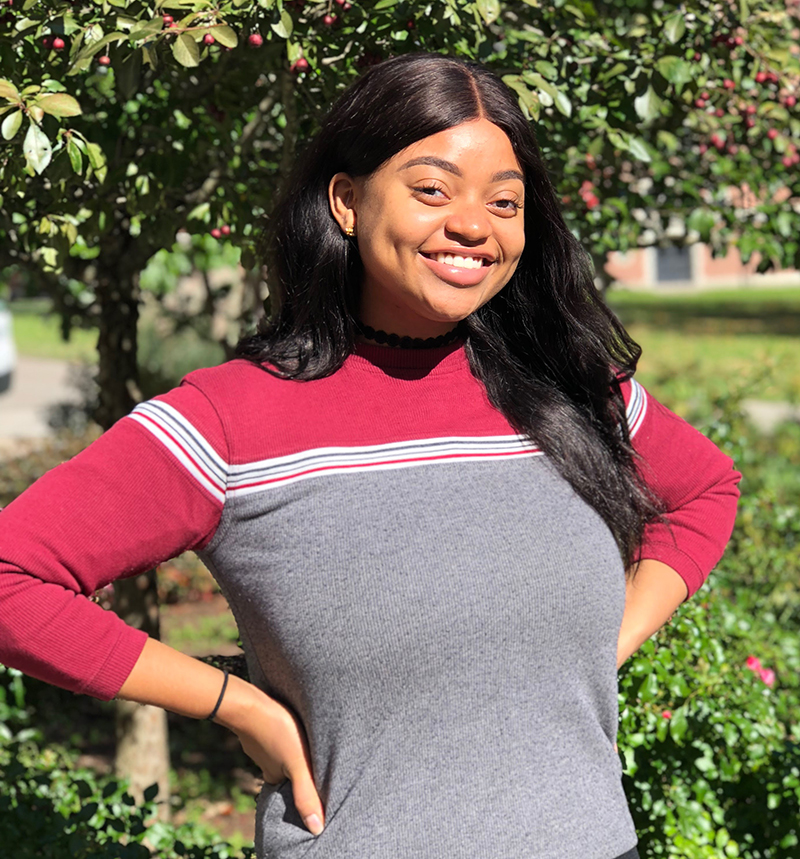Jadea Harris ’20 looks for ways to make arts therapy available to all
Growing up in Hartford, Connecticut, Jadea Harris ’20 was acutely aware of the poverty and health disparities in her community from the moment she was first able to make sense of her experiences. But as a child, she also strove to find the beauty in these spaces.
 “I always loved the graffiti and art on the walls of abandoned buildings,” she says. “I found that making art was a way to bring color to spaces that felt like they were lacking vibrancy.”
“I always loved the graffiti and art on the walls of abandoned buildings,” she says. “I found that making art was a way to bring color to spaces that felt like they were lacking vibrancy.”
In high school, Harris took a psychology course at her local community college and discovered that her interest in expressive activities like journaling, painting, and music could be incorporated into treating and preventing mental illness. As class president, she designed art workshops for freshmen and taught elementary summer school, using creative activities to educate disadvantaged youth and establish a safe space for expression.
Now a senior psychology major at Clark University, Harris is beginning to work on her psychology honors thesis, “Understanding Black experiences and access barriers to expressive arts therapies and related activities.” She is exploring the demographics of expressive arts therapy services — in particular, what is working for Black individuals who use creative activities to cope and heal, both inside and outside of clinical settings.
“This approach is pertinent for this population, especially considering how underrepresented Black communities are in clinical and medical settings due to several factors that prevent access,” she says. Story continues after video
As a former intern at the Worcester Center for Expressive Therapies, Harris noticed that the practice had very few Black-identifying patients — a trend she says is prevalent among private expressive arts therapy clinics. The internship provided Harris with evidence that her own community is missing from these healing spaces.
“A variety of people are reaching out for these services, but there are not a lot of people who look like me,” she says. “The Black and African American community could truly benefit from the same services.”
Through her honors thesis research, Harris hopes to better understand Black-identifying individuals’ use of art as a form of therapy. Her qualitative study will look at participants from the Worcester and Washington, D.C., areas to understand their experiences and the barriers they face to access therapy.
Harris is working to overcome a barrier of her own — a gap in the research concerning alternative-intervention awareness for Black communities at Clark and beyond. Although it’s been difficult to find the right resources, Harris has received support from psychology professors Ana Marcelo, her research adviser, and Nicole Overstreet, her academic adviser.
“Both of these inspirational women of color helped me navigate my own path,” she says.
Harris says developing such a novel thesis topic was intimidating, but Clark’s motto — “Challenge Convention. Change Our World.” — prompted her to introduce new research to the intellectual community. She plans to one day submit her work to the American Psychological Association with the goal of exhibiting at the APA’s annual convention of psychologists and mental health professionals.
Harris plans to continue on to graduate school and hopes to one day open her own private practice in expressive arts therapy for Black individuals.
“That would be my biggest contribution to a space where I can bring my research, hard work, and studies back to help heal and evoke growth in my community,” she says.
Through the Career Connections Center, you can find a job or internship, connect with employers and alumni career professionals, work on your resume, practice your interview skills, obtain advice, research careers, and much more. #clarkconnectsyou


